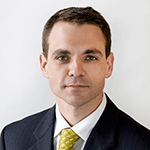Hector Gonzalez can’t pinpoint the moment he realized he wanted to be a lawyer. He just knows it’s something he wanted to do for quite some time. He and his family migrated from Cuba to the United States in 1969, and from the moment they arrived in New York, his parents put a strong emphasis on education. “Everything they did for me was to make sure I went to college and got an education,” Gonzalez says. He didn’t come from a long line of lawyers—in fact there were no lawyers in his family at all. But when Gonzalez was in college, he thought about going to law school constantly. “No one pushed me in that direction, it just sort of happened organically.”
Some of the subjects Gonzalez took an interest in when he was in high school and college may have indicated that he’d pursue a career in law. He enjoyed history and civics-related courses. His appreciation and understanding of government, the rule of law, and the importance of law as a defense for people without means was not atypical for an immigrant coming from a place like Cuba. Gonzalez graduated from the University of Pennsylvania Law School in 1988.
He decided to pursue his passion of becoming a prosecutor and took a job as a state prosecutor in the Manhattan District Attorney’s office. The combination of Gonzalez’s interest in courses like criminal law and procedure and the professors who taught them (many of whom were former state or federal prosecutors) had fueled his desire to become a prosecutor. He eventually became a federal prosecutor in the United States Attorneys’ Office in Manhattan, NY. During his 10 years as a prosecutor, Gonzalez worked on a number of interesting cases, from federal bank robbery to narcotics to organized crime. When he ended his time at the US Attorneys’ Office, Gonzalez was chief of the narcotics unit, a position that gave him great responsibility and litigating experience he may have missed at a large law firm.
“You have to appreciate the need to build relationships with clients and to make those relationships last for more than the lifespan of the case.”
Gonzalez decided to try his hand at private practice after a decade working as a prosecutor. A number of factors contributed to his decision—including the economics that come with living in New York—but mainly Gonzalez’s feeling that the timing was right. As a litigating partner at Dechert, LLP, Gonzalez has handled a number of different case types, including complex commercial litigation, criminal and civil administrative matters, SEC proceedings, and even Racketeer Influenced and Corrupt Organizations Act cases. He has represented the Bank of New York Mellon in litigation to help secure approval of an $8.5 billion proposed settlement with Bank of America; the former chief risk officer of Fannie Mae against fraud charges filed by the SEC; and a senior executive of a large pharmaceutical company in a Department of Justice investigation regarding potential violations of the False Claims Act.
“The transition into private practice is not as jarring as you might think,” Gonzalez says. “The ability to be in court and know how to litigate a case is something that you learn to do as prosecutor. These skills transfer easily to private practice, because what law firms and clients are looking for are your skills as a litigator.”
For Gonzalez, the biggest adjustment in moving to private practice was working with clients. As a prosecutor, he mostly dealt with agents, police departments, crime victims, and witnesses. By contrast, at Dechert he works with individual and corporate clients. Because there are costs that need to be considered, this type of interaction is quite different. Corporate clients want to know their counsel is proceeding in the most cost-efficient way possible, but not hampering the end product. It was a tightrope act that Gonzalez had to get used to. “You have to appreciate the need to build relationships with clients and to make those relationships last for more than the lifespan of the case.”
Juggling so many different types of cases might be unattractive to some lawyers, but Gonzalez welcomes the variety. In fact, the variety of his work is one of his favorite parts of the job, even if it means learning and relearning various subjects at any given time. “What’s appealing to me as a litigator, is that you’re not always doing the same thing,” Gonzalez says. “What’s appealing about litigation in a large law firm is the freshness every time you start working on a new case.”
Gonzalez has found time to offer his services to the public even though he is no longer a full-time public attorney. He has chaired the New York City Civilian Complaint Review Board. He has also served as the chair of the board of directors of New York Lawyers for the Public Interest. And he previously served on the board of directors of LatinoJustice.
Gonzalez loves his work with Dechert, but he also has an appreciation for being able to use his skills and resources to help other people who may not otherwise have a voice. “Being in private practice is a demanding career choice,” he says. “But you have to keep your perspective. One way to do that is by helping organizations trying to aid communities that are underserved and putting your skills and resources behind those organizations.” From Gonzalez’s perspective, part of being a lawyer is the willingness to give back.
Gonzalez figured out the direction he wanted to take in law after exploring the careers of some of his favorite professors. For aspiring law students who are unsure of what they’d like their specialty to be, Gonzalez recommends talking to practicing lawyers, especially younger ones. “I think that often what you do in law school is not going to give you enough information to make decisions about what areas you want to pursue,” he says.
Gonzalez believes it’s important for college seniors entering law school or first-year law students to try to establish networks and relationships. Junior practicing lawyers who understand what these students will experience coming out of law school can give them an idea of their professional options. Law students can benefit from relationships with senior lawyers too, but Gonzalez points out that they’re so far-removed from the postgraduate experience that they may not be able to help as much when picking a specialty. “Build relationships with younger lawyers who are doing different things right now,” Gonzalez says. “Try to understand what they’re doing, see if any of those areas appeal to you, and then focus on that.”

